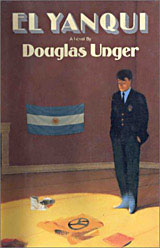
El Yanqui is a powerful, multidimensional story of a rambunctious young American of the 1960s who comes of age during ayear of privilege and danger in Buenos Aires. Winning a high school competition—mostly by staying nice and stoned—to study abroad, James is welcomed as a son into the ruch, influential Benevento family. Renamed Diego, he is taken out of his purple jeans, band jacket and cut-out sneakers and turned into one of the gilded youth of Buenos Aires, sporting the blazer of an elite prep school, his gray flannel trousers stuffed with pesos. After five months, Diego finds that Buenos Aires is in his blood, its power structure fixed vividly in his mind, its porteno dialect tripping from his tounge, his place among his peers confirmed by his being expelled from school for trying to seduce the Rector’s maid, by crashing one of the family Peugots, and by narrowly exaping being shot by the police when he and his friends are discovered painting “death to the dictatorship” across the front of the law school.
For Diego and his playboy sidekick, Marelli, politics is another joda, or trip: their specific objective is to find free-spirited girls; their vague one is to replace the military junta with the huge, ambitious figure of the exiled Juan Peron. But as the labor unions and university students mount strikes and demonstrations in Peron’s behalf, and the government retaliates with massive crackdowns, Diego finds himself sucked into the first waves of violence, panic and terrorism which will become a malestrom before long. When he is arrested, beaten senseless and then detained in a soccer stadium with thousands of others, he begins to understand the meaning of a police state.
The sundering of Argentine society is but one ground of interest in this ramifying and richly textured novel. The twists of Diego’s fortune take him many places—to a worker’s slum, a huge ranch in the pampas, where he works and whores as a gaucho, to a provincial nightclub, where he is again arrested. His inner life is riven with conflicts of identity and family loyalty, which reach a crisis when his favorite brother cracks up in Vietnam and, returned to the U.S.A., is committed by his parents. Diego must return home and become James again to spring his brother from the asylum. He comes of age amidst the madness of war and state terrorism from which the two brothers set out together toward whatever lies ahead.
—(Revised jacket copy from first edition)
Praise for El Yanqui:
El Yanqui is a novel about leave-taking… a coming-of-age novel set against the political and social turmoil of the late ’60s in the United States and Argentina. Unger is adept… in a finely tuned straight-ahead narrative… he lets the action speak for itself.
—Newsday
El Yanqui is a fast, entertaining novel; it limns a familiar time in an unfamiliar place with poignancy and style… Unger’s re-creation of the ’60s spacey idealism is perfect.
—USA Today
Glistens with vividness… Bright… funny… even exotic… An interesting twist to the rites of adolescence… Few contemporary novels combine the enthusiasm of youth with the perspective of maturity… but then few American novelists can match the verbal facility of its author.
—Seattle Times & Post Intelligencer
Evocative… Splendid… A mixture of charm, extravagance and melancholy.
—The Los Angeles Times
Rich and detailed… Unger brings so much life to his writing and such insight to the workings of life itself that we are thrilled to read… This universe-in-a-grain-of-sand feeling… leaves the reader with a sense of having experienced life in Argentina on at least as many levels as its protagonist.
—San Francisco Chronicle
A novel of considerable power… A bleak yet powerful and unusual novel that vividly chronicles a young man’s sexual encounters as it tracks his coming of age and the political ferment of the 1960s Argentina that surrounds him.
—Booklist
Douglas Unger is a gifted novelist with a decidedly political bent… He takes on everything from Vietnam to the Latin American military to Juan and Evita Peron to the ‘disappeared’ of Argentina, with a number of other stops along the way… Parallels are drawn between the behavior of the generals in Argentina and that of the United States in Vietnam… Unger is an accomplished writer so El Yanqui is a pleasure to read.
—The Washington Post